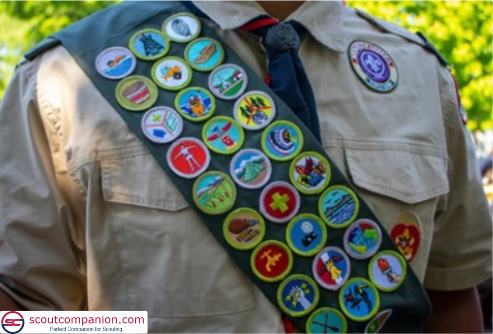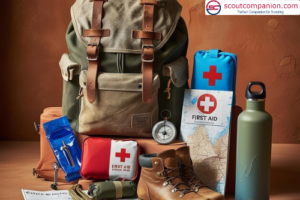Earning the first merit badge is one of the most exciting milestones in scouting. These merit badges not only teach valuable life skills but also help scouts explore new interests, build confidence and bring them closer to higher ranks like Eagle Scouts. For new scouts, earning a merit badge may seem a little tricky. So, this article is going to guide you through the step by step process from understanding the basics to completing the requirements and submitting your works along with 10 tips for earning first merit badge. To learn more about what is a merit badge and the tips for earning it, you can visit Boy Scouts of America Official Site.
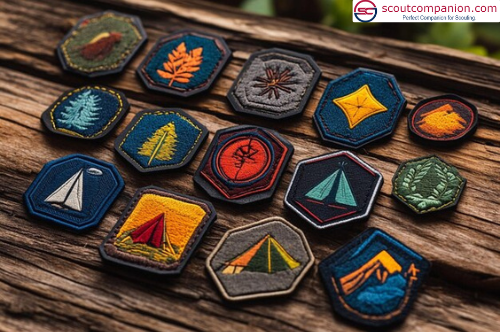
Table of Contents
Introduction
A merit badge in scouting is an award earned by scouts for completing a set of requirements in a specific subject area. These merit badge’s subject areas cover a wide range of topics including outdoor activities like camping and hiking and specialized field activities such as robotics, programming and art. These merit badges are specifically divided into two categories namely required badges and elective badges. Once the scout completed the assigned tasks, the scout meets their counselor to review their work. After approval the scout submits their blue card and receives the badges. Merit badges encourage learning and build confidence. Overall, merit badges make scouting more exciting, educational and rewarding.
Need for Merit Badges in Scouting
Merit badges are included in scouting to encourage personal growth, skill development, and exploration of new interests. The following are the reasons that justify the need for merit badges in scouting.
- Skill Building: Merit badges teach practical survival skills like first aid, cooking, swimming and camping which are useful in everyday life.
- Character Development: working to earn a merit badge helps scouts develop discipline, responsibility, and perseverance whereas completing the requirements teaches them the value of hard work and dedication.
- Exploration of Interests: The scouts will be given with 100 merit badges which they can use to discover new hobbies, interests and even potential career paths.
- Preparation for Leadership: Many merit badges require teamwork, problem-solving, and communication. These skills help scouts in their leadership development.
- Advancement in Scouting: The main purpose of merit badge is for achieving higher ranks like Eagle Scouts, which represents the highest level of achievement in scouting.
Overall, even though merit badges are a small reward for scouts for completing the requirements, they help the scouts to grow, learn, and prepare themselves for life while enjoying each moment in the scouting journey.
A Step-by-Step Process for New Scouts
Even though earning merit badges seems to be an adventurous and fun-filled activity, the new scouts will find it tricky as they lack the knowledge of step-by-step process to earn first merit badge. So, here is a comprehensive process that helps new scouts in earning their first merit badge.
- Understand what merit badges are
- Choose your first merit badge
- Get approval from your scout master
- Find a merit badge counselor
- Review the requirements
- Plan your approach
- Complete the requirements
- Meet with your counselor
- Submit your blue card
Step 1: Understand What Merit Badges Are
Understanding what merit badges are is important because it helps scouts see their value and purpose in the scouting program. Also merit badges are not just patches to collect; they represent growth, learning, and achievement. Merit badges are awards that scouts earn by completing a set of requirements in a specific area of interest, such as first aid, cooking, hiking, or programming. They serve multiple purposes:
- Encouraging skill development.
- Fostering personal growth.
- Introducing scouts to potential career paths or hobbies.
Earning a merit badge is not just about learning facts but also about practicing skills and gaining hands-on experience. For example, a scout working on the First Aid badge will learn how to treat wounds, handle emergencies, and potentially save lives.
Two Types of Merit Badges
There are two types of Merit badges in scouting where each plays a unique role.
- Required Badges
- Elective Badges
1. Required Badges
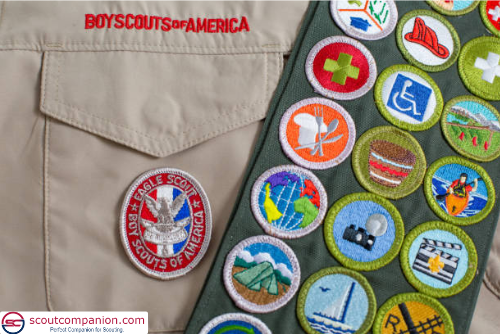
The main purpose of required badges is to upgrade to achieve higher ranks in scouting, including the prestigious Eagle Scout Rank, which is the highest rank in scouting. These badges focus on fundamental skills and knowledge that every scout should possess.
There are currently 14 required badges. Now let’s look at the 14 required badges.
- Camping
- Citizenship in the Community
- Citizenship in the Nation
- Citizenship in the World
- Communication
- Cooking
- Cycling, Hiking, or Swimming (choose one)
- Emergency Preparedness or Lifesaving (choose one)
- Environmental Science or Sustainability (choose one)
- Family Life
- First Aid
- Personal Fitness
- Personal Management
- Safety
These badges are challenging but also rewarding, because it requires scouts to invest their high level of effort and commitment. By earning these required badges, scouts show them that they are prepared and ready for leadership roles and can handle real-world situations responsibly.
2. Elective Badges
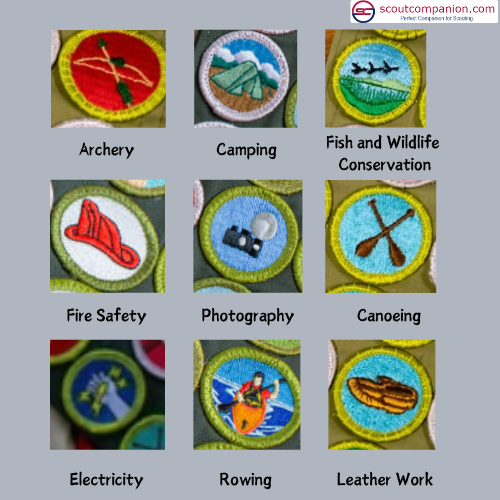
Elective merit badges, on the other hand, allow scouts to explore their personal interests and discover new hobbies or potential career paths because they are all about exploration and personal growth. They encourage scouts to step out of their comfort zones and try activities they might not have considered before. Through these experiences, scouts often discover lifelong hobbies or even potential careers. There are over 100 elective badges and let’s look at some of them.
- Archery
- Fire Safety
- Electricity
- Camping
- Photography
- Rowing
- Fish and Wild Life Conservation
- Canoeing
- Leather Work
- Archaeology
- Art
- Astronomy
- Chess
- Coin Collecting
- Digital Technology
- Engineering
- Journalism
- Programming
- Space Exploration
- Robotics
Unlike required badges, elective badges give scouts the freedom to pursue areas they discover exciting or engaging. For example, a scout interested in technology might choose the Programming or Robotics badge, while someone with an artistic side might explore the Art or Photography badge.
Step 2: Choose Your First Merit Badge
Choosing your first merit badge is an exciting step, as it marks the beginning of your merit badge journey. Your choice can set the tone for the entire experience, so it’s important to pick a badge that matches your interests, skills, and comfort level. Here’s how to choose your first merit badge
- Start with a Beginner-Friendly Badge:
- Some merit badges are better suited for new scouts, such as First Aid, fingerprinting, photography, Cooking, or Swimming as they have straightforward requirements and are a good way to get familiar with the process.
- Look for badges that align with activities you’re already involved in or interested in because it will make the process more fun and engaging.
- Consult the Merit Badge Handbook:
- Review the list of available badges in the handbook or on the scouting website.
- Read through the descriptions and requirements.
- Seek Advice:
- Talk to your Scoutmaster, troop leaders, parents, or older scouts for recommendations.
- Ask about badges that are often taught in group settings or scouting events.
- Don’t Overthink it:
- Your first merit badge doesn’t have to be perfect because it is just a learning experience.
- Remember, you will have plenty of time to explore other badges as you progress in scouting.
Step 3: Get Approval from Your Scoutmaster
Once you have chosen your first merit badge, the next step you need to do is to get approval from your Scoutmaster. This step is mandatory because it ensures that you are following the correct process and have the support that you need to earn the merit badge. Here is what you need to do:
- Meet with Your Scoutmaster:
- Express your interest in a particular badge or what you have chosen.
- Explain why you chose that particular badge and what excites you.
- They’ll guide you through the process and ensure you understand the requirements.
- Get a “Blue Card”:
- The “blue card” is an official merit badge application form.
- This card is used to track your progress and serves as an official proof for your completed badge requirements.
- Your Scoutmaster will sign the card to indicate their approval.
Step 4: Find a Merit Badge Counselor
Merit badge counselors are adults who are registered with the scouting organization and have expertise in the badge’s subject area. They will guide you through the requirements and ensure you complete them correctly. Counselors are essential for helping you stay on track, learning the requirements thoroughly, and meeting all the requirements. This partnership is a key part of your scouting journey and teaches you how to communicate, collaborate, and take responsibility for your work.
- Ask Your Scoutmaster or Troop Leader:
- Your Scoutmaster or troop leader should your first point of contact.
- They maintain a list of approved merit badge counselors for different badges.
- They can connect you with a registered counselor for your chosen badge.
- Contact the Counselor:
- Be Respectful: Address them politely and explain that you are starting to work on the badge.
- Be Prepared: Mention the badge you are working on and ask about their availability for a meeting or discussion.
- Schedule a Meeting: Work with the counselor to set up a time to talk, either in person, by phone, or online, depending on their preference.
Step 5: Review the Requirements
Every merit badge has specific requirements that must be completed to earn it. Before you begin working on a merit badge, it is crucial to review the requirements thoroughly. Every merit badge has a set of specific tasks that need to be completed in order to earn it, and understanding these requirements is the first step toward success. These requirements are typically explained in the Merit Badge Pamphlet or other official scouting materials provided by the organization.
These are typically outlined in the Merit Badge Pamphlet or official scouting materials.
- Read the Pamphlet:
- Obtain the pamphlet for your chosen badge.
- Understand the expectations and what you need to learn or do.
- Highlight Key Requirements:
- Take note of tasks that might require additional planning, such as service projects or field activities.
- Ask Questions:
- If any requirements seem unclear, ask your counselor or Scoutmaster for clarification.
Step 6: Plan Your Approach
Earning a merit badge not only requires just knowledge and skills but also careful organization and effort. A clear plan is essential to ensure you complete all the requirements efficiently and effectively. By breaking down the tasks into smaller steps and creating a timeline, you can stay organized and motivated throughout the process. Here is how to plan your approach to earn a merit badge:
- Set a Timeline:
- Decide when you would like to complete the badge.
- Break down the requirements into manageable steps.
- Schedule your time to study and practice to stay on the track.
- Don’t leave the tasks until the last minutes.
- Gather Materials:
- Identify any tools, resources, or equipment you’ll need.
- For example: Cooking merit badge might require recipes and cooking utensils.
- Practice Skills:
- If the badge involves physical or practical skills, dedicate time to practice.
- Schedule regular practice sessions and track your progress.
Step 7: Complete the Requirements
Once you have planned your approach, it is time to work through each requirement methodically. This step is crucial because it involves putting your plan into action and ensuring that you meet all the expectations set by your merit badge counselor. Completing the requirements for a merit badge requires focus, effort, and attention to detail, but by staying organized and following your plan, you can make steady progress toward earning your badge.
- Document Your Progress:
- Use your blue card to track completed requirements.
- Take notes or photos if the badge involves projects or presentations.
- Participate Actively:
- Attend any workshops or group activities related to your badge.
- Engage with your counselor and ask for feedback.
- Demonstrate Skills:
- Be prepared to show what you’ve learned, whether through a test, demonstration, or presentation.
Step 8: Meet with Your Counselor
After you have completed all the requirements for your merit badge, the next important step is to meet your merit badge counselor for a follow-up meeting. This meeting is crucial as it allows your counselor to evaluate your work, verify that you have completed the tasks correctly, and officially sign off on your progress. It is also an opportunity for you to showcase the knowledge and skills you have developed throughout the learning process.
- Review Your Work:
- Present any documentation, projects, or evidence of completed tasks.
- Answer any questions or perform additional demonstrations if needed.
- Get the Blue Card Signed:
- Once your counselor confirms you’ve met all the requirements, they’ll sign your blue card.
Step 9: Submit Your Blue Card
After you have met your merit badge counselor and successfully completed all the requirements, the final step in the process is submitting your blue card for official recognition. The blue card serves as your official record of the merit badge you’ve earned, and submitting it ensures that your achievement is properly recognized by the scouting organization. This step may seem simple, but it is an essential part of the process and signals the completion of your hard work.
- Return the Card to Your Scoutmaster:
- Your Scoutmaster will review the card and ensure everything is in order.
- Receive Your Badge:
- After approval, your merit badge will be awarded during a troop meeting or court of honor.
10 Tips For Earning First Merit Badge
1. Stay Organized : Keep all documents, blue cards, and materials in a safe, easy to access place and ensure nothing gets lost.
2. Ask for Help : If you’re unsure about anything don’t hesitate to ask questions. Seek guidance from your merit badge counselor, Scoutmaster, or even your parents.
3. Enjoy the Process: The journey of earning a merit badge is just as important as the destination. Don’t just focus on the badge. Embrace the learning experience
4. Break Down the Requirements : Instead of feeling overwhelmed, break the badge’s requirements into smaller tasks. This will help you manage your time and make step-by-step progress.
5. Create a Schedule: Set aside time each week to work on your merit badge. Having a schedule will help you stay focused and on track to complete the badge.
6. Practice the Skills: If the merit badge involves hands-on skills, such as Swimming, Archery, or Cooking, be sure to practice regularly.
7. Take Notes: Keep a notebook or journal to document your progress, thoughts, and observations as you work through the requirements.
8. Be Honest: If you have not completed a requirement or are not confident in your skills, be honest with your counselor.
9. Participate in Group Activities: If your merit badge involves group activities or workshops, attend them! These experiences can help you learn faster, make new friends, and get hands-on experience.
10. Ask for Feedback: Request feedback from your counselor after demonstrating a skill or completing a task. Constructive feedback will help you improve and ensure you’re on the right path.
Conclusion
Earning your first merit badge is a rewarding experience that fosters personal growth, skill development, and confidence. By following the steps from understanding the badge, choosing wisely, getting approval, working with a counselor, and completing the requirements, you will not only earn a badge but also gain valuable life skills. The process encourages responsibility, teamwork, and perseverance, all of which are essential for future leadership roles. Remember, merit badges are opportunities to explore new interests and build character, making the journey just as important as the accomplishment. Embrace the experience, stay focused, and enjoy the learning process throughout your scouting adventure.
